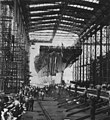USS Saipan (CVL-48)
The first USS Saipan (CVL-48/AVT-6/CC-3) was a light aircraft carrier of the United States Navy, the lead ship of her class of carrier. She was later selected for conversion into a command ship in 1963–1964, but instead of becoming a command ship she was converted to the Major Communications Relay Ship Arlington (AGMR-2) in 1965.
For other ships with the same name, see USS Saipan and USS Arlington.Saipan was laid down on 10 July 1944 by the New York Shipbuilding Corporation, Camden, New Jersey, launched on 8 July 1945, sponsored by Mrs. John W. McCormack, and commissioned on 14 July 1946, Capt. John G. Crommelin in command.
Service history[edit]
Commissioned[edit]
Commissioned 11 months after the close of World War II, Saipan trained student pilots out of Pensacola, Florida, from September 1946 to April 1947[1] when, reassigned to Norfolk, Virginia, as homeport, she departed the Gulf of Mexico; participated in exercises in the Caribbean; then proceeded to Philadelphia for overhaul. In November, she returned to Pensacola; but, in late December, after training midshipmen, steamed back to the east coast to serve with the Operational Development Force.
In February 1948, however, her work in jet operational techniques, carrier support tactics, and electronic instrument evaluation was interrupted briefly. From the 7th to the 24th, she was engaged in transporting the United States delegation to the Venezuelan Presidential inauguration and back. On her return, she conducted local operations off the Virginia Capes, and in April, after a visit to Portsmouth, New Hampshire, she resumed work for the Operational Development Force. On 18 April, she also relieved Mindoro as flagship of Carrier Division 17 (CarDiv 17).
Fighter Squadron 17A[edit]
On 19 April, she departed Norfolk for Quonset Point, Rhode Island, where, on 3 May, she embarked Fighter Squadron 17A. Three days later, all squadron pilots had qualified in FH-1 Phantom jets. The squadron had become the first carrier-based jet squadron. Back at Norfolk by the end of the month, Saipan was relieved of flagship duties. In June, she returned to New England waters; and, in July, she commenced overhaul at Norfolk. In December, she resumed local operations. On 24 December, she was ordered to embark two of the Navy's latest type helicopter, the XHJS-1, and three Marine Corps HRP-1 helicopters and proceeded north to Greenland to assist in the rescue of eleven airmen downed on the ice cap. Departing Norfolk on Christmas Day, she arrived off Cape Farewell on 28 December and prepared to launch the helicopters as soon as weather allowed. On 29 December however, a C-47, equipped with jet assist takeoff and skis, landed on the ice, took on the marooned airmen and made it out again.
1949-1954[edit]
Saipan then returned to Norfolk, arrived on 31 December, and sailed again on 28 January 1949. Steaming south, she conducted exercises out of Guantanamo Bay into March and returned to Hampton Roads on 10 March. From 11 to 19 March, she conducted operations for the development force; then made a reserve training cruise to Canada. At the end of May, she again commenced work for the Operational Development Force. Three months later, she conducted her second reservist cruise of the year, then qualified Royal Canadian Navy pilots in carrier landings.
From November 1949 – March 1951, Saipan remained on the east coast, operating from the Virginia Capes south. On 6 March 1951, she got underway as flagship, CarDiv 14, and sailed for duty with the Sixth Fleet. Deployed for three months, she plied the waters of the western Mediterranean until the end of May, then headed for home. On 8 June, she was back at Norfolk, whence she resumed operations in the western Atlantic from Greenland to the Caribbean.
For over two years, Saipan continued Second Fleet operations, interrupting them for midshipman cruises during the summers of 1952 and 1953 and for an overhaul. In October 1953, she departed the east coast and steamed for the Panama Canal and the Pacific. On 30 October, she arrived at San Diego, whence she continued on to Pearl Harbor, Yokosuka, and duty off the coast of Korea in support of the uneasy truce agreement.











